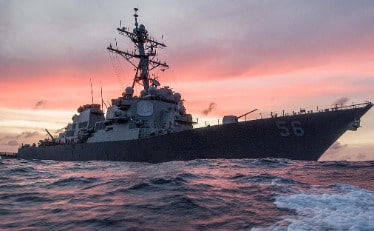
Chinese and Russian naval forces began a joint exercise at a southern Chinese military port, the spokesperson for China’s Ministry of National Defense, Zhang Xiaogang, announced Friday. The annual “Maritime Joint-2024” exercise, agreed upon by both nations, is taking place near Zhanjiang until mid-July. Its stated objectives include demonstrating the partners’ ability to address maritime security threats, maintain regional stability, and deepen their strategic partnership.
During the opening ceremony, military officials from both nations said the joint exercises bolstered cooperation and elevated professional standards. Following the ceremony, China’s state broadcaster CCTV reported that the exercises will unfold in multiple phases. Initially, the two sides will engage in desktop simulations and tactical coordination. Subsequently, Chinese and Russian naval fleets will conduct joint exercises in the sea and airspace near Zhanjiang. These operations will encompass a wide range of activities, including anchorage defense, joint reconnaissance and early warning, search and rescue missions, anti-submarine warfare, anti-missile operations, and air defense maneuvers. Additionally, the forces will conduct training sessions focused on the practical application of weaponry.
This naval cooperation unfolds against a backdrop of mounting tensions between China and NATO allies. At their July 9-11 Washington Summit, NATO members designated China as a “decisive enabler” of Russia’s actions in Ukraine, citing their “no-holds-barred partnership” and China’s support for the Russian defense industry. The alliance also voiced concerns about Beijing’s nuclear arsenal and space capabilities. The final communiqué, endorsed by all 32 NATO members, clearly signals that China is becoming a focal point for the military alliance:
The People’s Republic of China’s (PRC) stated ambitions and coercive policies continue to challenge our interests, security and values. The deepening strategic partnership between Russia and the PRC and their mutually reinforcing attempts to undercut and reshape the rules-based international order, are a cause for profound concern. We are confronted by hybrid, cyber, space, and other threats and malicious activities from state and non-state actors.
In response, China accused NATO of pursuing security at the expense of others and cautioned against introducing “chaos” to Asia, while reiterating its neutrality on the Ukraine conflict. Despite these tensions, China’s Defense Ministry recently disclosed that Chinese and Russian naval vessels had completed their fourth joint maritime patrol in the western and northern Pacific Ocean. The Ministry stressed that this patrol neither targeted any third party nor bore any relation to current international or regional situations.
Article: China and Russia launch joint naval exercise amid NATO tensions


